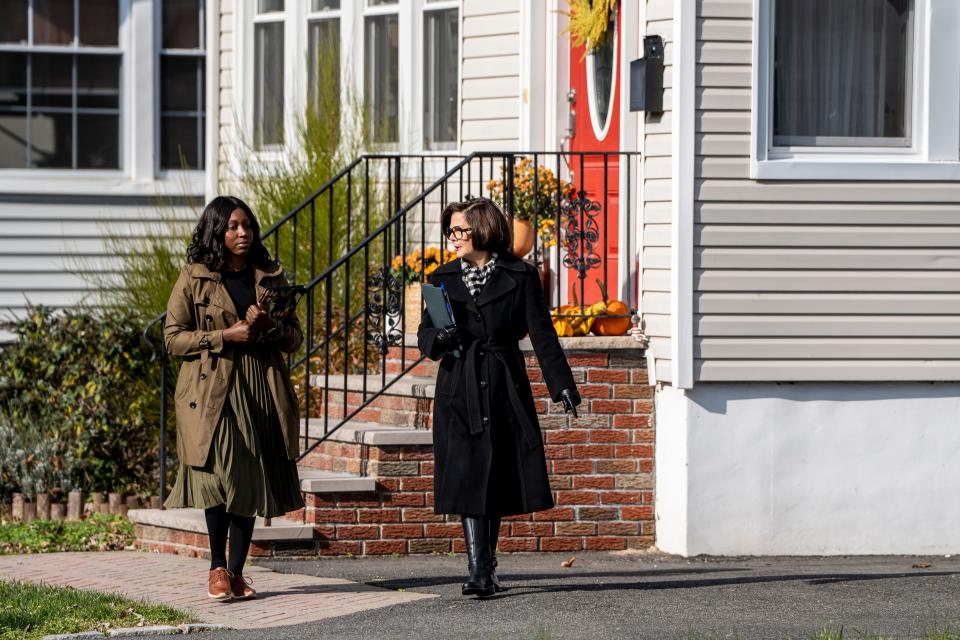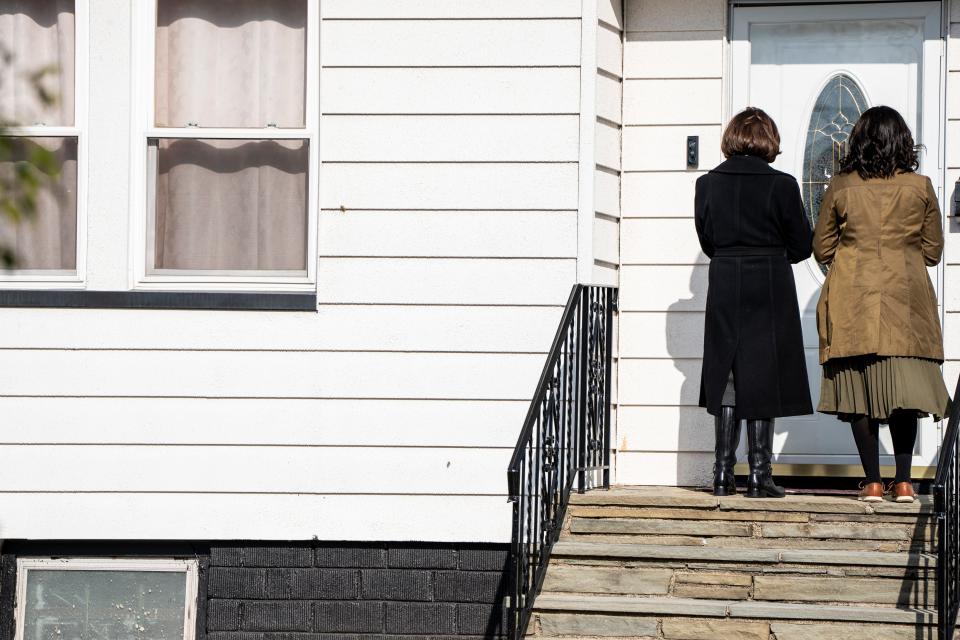'Eager for hope:' Jehovah's Witnesses in NJ find more doors open after COVID hiatus ends
When Susan Cohen resumed door-knocking after a 2½-year pandemic hiatus for Jehovah's Witnesses, she feared that people might slam the door in her face.
"After COVID, I didn't know what to expect," said the Montclair woman, who's been sharing her faith for almost 45 years through the Witnesses' trademark front-door evangelism.
Her worries proved unfounded this fall when she and fellow members across the globe returned to the field. Cohen, a self-described "people person," spent her first day sharing stories and literature with neighbors in Glen Ridge and West Orange.
"People were so happy to be able to talk face-to-face," said Cohen, whose energy seems to belie her 76 years.

It was a different experience than pre-pandemic, when people were rarely home and those who were often declined to talk, she recalls.
"They take the time now," Cohen said. "Many feel vulnerable following what we went through — the war, a terrible economy, so many people dying from COVID. People are in a desperate situation and many are eager for hope."
Jehovah's Witnesses is a Christian denomination with more than 8.6 million adherents around the globe, including 1.3 million the U.S., according to the Warwick, New York-based group.
Face-to-face appeals are not just a mainstay of the faith, but a practice the group has fought to preserve for decades, said spokesman Robert Hendricks. In June, Jehovah's Witnesses marked the 20th anniversary of a U.S. Supreme Court ruling protecting its right to knock on doors without being compelled to get a government permit.
The group suspended door-to-door evangelization in the early days of the pandemic, just as the rest of society went into lockdown. It also shut down its 13,000 U.S. congregations and canceled in-person gatherings. (Members began meeting again in April of this year).
"The pandemic taught us that there are many ways to reach people, said Robert Acevedo, a Jehovah's Witnesses elder from Elizabeth. "We learned to reach people through letter-writing and phone calls and virtual Bible studies."

'Outreach is foundational'
Cohen continued her ministry through letters and phone calls to strangers and discovered she was able to reach more people remotely than on foot. With many working from home — and yearning for human connection — she found people grateful for uplifting conversation.
The modified outreach was still successful, according to Jehovah's Witnesses. The group grew during the pandemic, baptizing an additional 500,000 people worldwide, Hendricks said. COVID was difficult, but "it's made us stronger and better," he said.
Nevertheless, such tactics lacked the face-to-face interactions that the Witnesses consider vital.
"Outreach is foundational. It's a seminal teaching of Jesus," said Hendricks. "The last thing he ever said was about evangelism. We have taken up that mantle. That's who we are. We are witnesses. If we don't testify about our creator, then we are not witnesses. We don't preach to ourselves, we reach out to our neighbors."
Door-to-door visits officially restarted on Sept. 1.
Since then, Cohen has found many Zoomsters willing to break away from the virtual grind to discuss deeper questions.
During her travels through North Jersey, one person asked her why children suffer and what happens after death. Another wanted to talk about friends and relatives lost to COVID-19. A visiting couple who speak only Turkish were thrilled when Cohen showed them a short Bible video in their own language.
More: She knocked on New Jersey doors for decades. Then COVID changed everything
Dinner for 6,500: NJ to host record gathering for growing Chabad Jewish movement
One woman plopped down on her front doorstep and said she had never wanted a Bible study session before the pandemic but was eager for one now. Cohen said she would return to her on a regular basis.
On one recent trip, Cohen went house to house with her colleague and friend Sandy Massillon of Montclair, who became a member a decade ago after joining a free Bible study class. The return to the field was gratifying, she said.
"It helps us to feel more connected to our neighbors," she said, "and provide them with the comfort they need in person."
Origins of Jehovah's Witnesses
Jehovah's Witnesses is a Christian denomination whose beliefs are distinct from traditional Christianity. It grew out of the Bible Student Movement founded by Pittsburgh preacher Charles Taze Russell in the late 1870s. The religion's doctrines are established by a group of elders based in Warwick.
Members, who are politically neutral, consider much of secular society to be morally corrupt. Holidays, such as Christmas and Mother's Day, are not observed by the faith, which cites their pagan origins. The group also does not accept most blood transfusions, citing a Biblical prohibition on ingesting blood. In serious cases, members typically request that doctors seek the best alternative that would respect their religious beliefs.
Famous members have included the late singer and songwriter Prince, who was baptized as an adult; Michelle Rodriguez, the "Lost" actress who grew up as a Jehovah's Witness; and tennis champion Serena Williams, who was raised in the faith.
While its members say Jehovah's Witnesses has given them inspiration, some have accused it of being a cult that controls followers with overly strict routines, shuns those who leave and endangers people with its ban on blood transfusions.
Mark Silk, a religion professor at Trinity College in Hartford, Connecticut, said in an interview with The Record last year that Jehovah's Witnesses "do not engage in normal civic behavior and try to separate from public life. They don't vote...They don't recite the Pledge of Allegiance. Their views are out of the mainstream."
According to the 2014 Pew Religious Landscape Study, Jehovah's Witnesses, who make up less than 1% of U.S. adults, are among the most racially and ethnically diverse religious groups in America: 36% are white, 32% are Hispanic, 27% are black and 6% are another race or mixed race.
"Being part of such a diverse denomination means that I belong to the largest family on Earth," said Massillon, who is of Haitian descent. "It has been my experience that I can find myself in any part of the world and find family who love and take me in as their own."
The vast majority, 65%, are converts who were raised in another faith, according to the Pew study.

That includes Cohen, who grew up in a Conservative Jewish family in Passaic before converting almost a half-century ago. Although she learned Hebrew as a child, she never studied the Bible or connected much with her family's faith or traditions, she said.
In 1975, when she was a divorced mother with a young son living in Verona, she heard a knock on her front door and opened it to a Jehovah's Witness. She wasn't searching for religion but was curious to know what the Bible said and began studying with the Witnesses, she said. Eventually, she joined the group.
Cohen knows firsthand how powerful the human connection of "witnessing" can be.
"Face-to-face contact is much more personal. With eye contact, people are more readily put at ease," she said. "This can help them feel more comfortable to ask the questions that have been on their minds and pave the way for more meaningful discussions.
"My goal is not to force someone to become one of Jehovah's Witnesses, but to use the Bible to answer their questions, and share with them their purpose in the world," Cohen said. "Whatever they choose to do with that information is up to them."
Deena Yellin covers religion for NorthJersey.com. For unlimited access to her work covering how the spiritual intersects with our daily lives, please subscribe or activate your digital account today.
Email: yellin@northjersey.com; Twitter: @deenayellin
This article originally appeared on NorthJersey.com: Jehovah's Witnesses return to NJ door-knocking after long COVID hiatus

